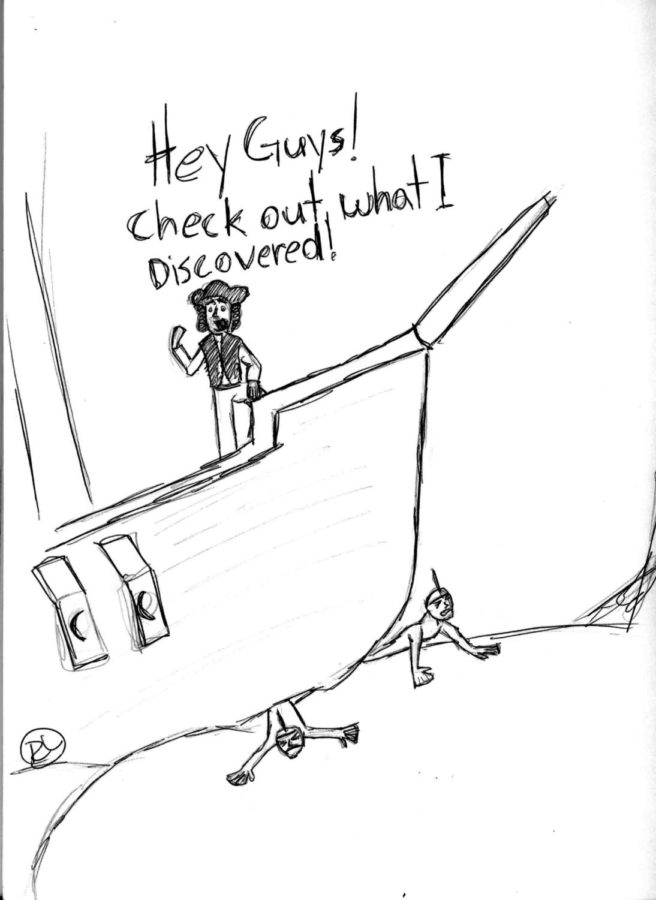Snyder: Rethink the glorification of Columbus Day; why some rebranding is overdue
Columnist Stephen Snyder argues for the rebranding of Columbus Day, given that Christopher Columbus’ most lasting legacies are the establishment of the transatlantic slave trade and numerous indigenous genocides.
October 16, 2014
Though many Iowans may not have been aware—at least those who are not employed by the federal government—Columbus Day was on Monday, Oct. 13. Part of the reason that the federal holiday went unnoticed is because it is not actually recognized by the state of Iowa, as well as many other states.
Another reason for the lack of Columbus Day awareness was a campaign undertaken by many Americans, specifically in Minneapolis and Seattle. The campaign referred to the holiday as Indigenous People’s Day, a worthy replacement when you consider the fact that Columbus did his fair share to remove those people from the face of the earth.
In the face of such changes, many people have bemoaned the idea of altering the federal holiday, which has been observed in near constant criticism in the United States since 1937. However, I have to ask the question: do we know what we’re celebrating?
Of course you know the basics of the holiday. “In 1492, Columbus sailed the ocean blue,” so on and so forth, we all know the rhyme. Columbus landed on the islands now known as The Bahamas, where they celebrate the holiday as Discovery Day. This event led to the colonization of the Western World, which in turn set the foundation for the society we know and live in today.
However, the truth of the story, which is often ignored, tells us that the idea of changing the name is more about changing the concept of the holiday itself. Simply not supporting the idea doesn’t go far enough. Iowa, and the nation, should support movements to change the image of the holiday.
When I mention the atrocities committed by Columbus, such as beginning the transatlantic slave trade or genocide of indigenous people in the pursuit of gold, you won’t bat an eye. Wait, you mean you weren’t taught that as part of your fourth grade history class? That’s probably for the same reason that the Trail of Tears gets skimmed over in those same history classes. That truth isn’t necessarily flattering for the origins of our society.
When Columbus came to the Western World, he did not behave as a decent human being, and he set that principle in stone for the colonists that came after him. This sentiment is not based in “leftist oversensitivity.” There are sources which describe the terror Columbus wreaked upon the world which had the misfortune of receiving him, as well as the legacy he left.
In his book “A Brief Account of the Destruction of the Indies”, Bartolomé de las Casas details the horrors that followed Columbus as he saw them.
“What we committed in the Indies stands out among the most unpardonable offenses ever committed against God and mankind and this trade [in Indian slaves] as one of the most unjust, evil and cruel among them,” Bartolomé de las Casas said.
History is meant to be a progressive entity. If a famed and celebrated individual commits a horrible act which is only discovered after their death, they are usually defamed. The exact opposite process is in play for this situation. If Columbus and his fellow colonizers were viewed as tyrants even while committing the acts, then why are we celebrating him now?
Columbus is famous for “discovering” the Western World, and our culture has perpetuated that lie for more than 500 years. Columbus, if anything, was simply the first European Christian with the support of political powers to find the New World.
Historical evidence exists to show that Vikings from Northern Europe visited North America long before Columbus was even born. Vikings established settlements around 1,000 A.D. on the northern tip of the continent, now known as Newfoundland, Canada. The Vikings may not have been alone in beating Columbus to the West, as the Phoenicians, an ancient civilization from the Mediterranean still renowned for their seafaring prowess, may have traveled across the Atlantic even earlier than the Vikings, around 2,000 B.C.
Amazingly, it seems that these voyages to the Western World did not result in any instances of enslavement or the genocide of indigenous people.
We must also question the semantics of saying that any of these three parties “discovered” the New World. How exactly did Columbus justify discovering the New World when literally millions of people already inhabited the islands he visited?
Lastly, think about the actual reason why Columbus set out on his voyage. He was not trying to discover a new world but instead to discover more efficient trade routes to India. Not only did he fail miserably but he did so as a result of his own mathematical shortcomings. He made incorrect calculations about Earth’s circumference and—by a happy accident—landed himself in The Bahamas.
Fine, he still made a great discovery for Europe even if he only did so by accident. However, it’s one thing to be wrong, but a completely different matter to vehemently deny your mistake. Columbus claimed that he had indeed landed in Asia until his death in 1506, despite evidence and maps presented to the world by Amerigo Vespucci in 1502.
Campaigns to rename and restructure the holiday to focus on the people that time has forgotten are vital to the preservation of history. Not the history we’ve been told but the history that is true. Columbus Day has become an archaic term since 1937 and does not represent the progressively intentioned society in which we live. When we celebrate Columbus Day, we are celebrating the man who was responsible for the New World’s first genocide. Here’s to you, Christopher.







